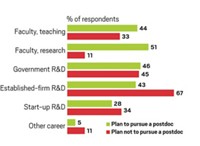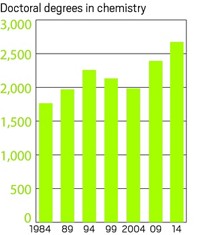Advertisement
Grab your lab coat. Let's get started
Welcome!
Welcome!
Create an account below to get 6 C&EN articles per month, receive newsletters and more - all free.
It seems this is your first time logging in online. Please enter the following information to continue.
As an ACS member you automatically get access to this site. All we need is few more details to create your reading experience.
Not you? Sign in with a different account.
Not you? Sign in with a different account.
ERROR 1
ERROR 1
ERROR 2
ERROR 2
ERROR 2
ERROR 2
ERROR 2
Password and Confirm password must match.
If you have an ACS member number, please enter it here so we can link this account to your membership. (optional)
ERROR 2
ACS values your privacy. By submitting your information, you are gaining access to C&EN and subscribing to our weekly newsletter. We use the information you provide to make your reading experience better, and we will never sell your data to third party members.
Careers
Ph.D. Recipients Boost Economy
Investment in doctoral students has local impact, study shows
by Andrea Widener
January 4, 2016
| A version of this story appeared in
Volume 94, Issue 1
Doctoral degree recipients supported by research grants made an important impact on the economy, earning higher wages and working at research and development companies at higher rates than other workers, according to an analysis of graduates from eight Midwestern universities (Science 2015, DOI: 10.1126/science.aac5949).
The study by several labor economists attempts to identify the value of doctoral training across many fields—including chemistry—by examining earnings in the years immediately after graduates receive their Ph.D. degrees.

NOTE: R&D-performing firms are those listed in the National Science Foundation’s Business R&D & Innovation Survey.
SOURCE: Science 2015, DOI: 10.1126/science.aac5949
Perhaps the most important finding involves geography. An unexpectedly high 22% of doctoral degree recipients in the study remained in the Midwestern state where they got their doctorates.
Demonstrating that highly educated and highly paid workers stay in a state reinforces why legislators should support local universities, says James Batteas, a chemistry professor at Texas A&M University. “The data show the clear value of the investments in higher education made through state universities and by other institutions of higher learning as a whole.”
The Science paper is part of a larger effort by labor economists to measure the value of research investments. The authors examined records for 3,197 people supported on research grants who received their Ph.D.s between 2009 and 2011. Eight universities—Indiana, Bloomington; Iowa; Michigan, Ann Arbor; Minnesota, Twin Cities; Ohio State; Purdue; Penn State; and Wisconsin, Madison—participated through the nonprofit Committee on Institutional Cooperation’s UMETRICS project.
The economists matched the Ph.D. recipients with anonymized U.S. Census data, which allowed them to track their earnings from 2010 to 2012, explains Ohio State economist Bruce Weinberg, the paper’s corresponding author.
The researchers found that almost 40% of graduates go to industry, where they are likely to be hired by R&D-performing companies. Another 57% go into academia, and 4% end up in government.
The economists were also able to examine data on specific disciplines, including chemistry. “Chemistry does pretty well in a lot of different dimensions—there are people going to high-wage firms; they are likely going to R&D-performing firms,” says Weinberg, who studies the science workforce.
But chemistry Ph.D. recipients made less money than those from many other science, technology, engineering, and mathematics (STEM) disciplines. Mean earnings for all chemists in the study were $43,000 per year. In contrast, all graduates working in industry earned a mean of $58,000. “Why is it that chemistry looks so strong in so many areas but lags behind in salary?” Weinberg asks.
The Science paper’s authors don’t have the data to answer that question—they don’t know a person’s job title, just that person’s employer. But one possible explanation is that more chemists serve as postdocs, who tend to get low salaries, says Steven Corcelli, chair of the American Chemical Society’s Graduate Education Advisory Board and a University of Notre Dame professor. That’s less true of engineers or computer scientists.
Batteas was surprised to see that the average salary for doctoral degree chemists was so low. Graduates who leave his physical chemistry lab for industry tend to make higher wages. “Even though their average salary was lower, an equal proportion of chemists were entering high-wage businesses,” Batteas says.
Many companies tend to hire engineers, mathematicians, and computer scientists because they are seen as experts in quantitative analysis. It’s not clear to Corcelli why chemists aren’t always included in that group. “That creates an opportunity” for the community to promote chemists’ quantitative skills, he says.
The paper shows doctoral degrees are a good investment, Corcelli says. That’s an important message for those who support research. “This argument ties research to economic development,” he says, “and that’s a language that Congress speaks.”







Join the conversation
Contact the reporter
Submit a Letter to the Editor for publication
Engage with us on Twitter